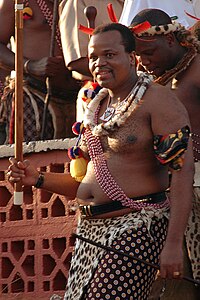Ngwenyama: Difference between revisions
Added a small statement about the Ndlovukati |
Added more about his powers Tags: content sourced to vanity press Visual edit |
||
| Line 27: | Line 27: | ||
== Powers == |
== Powers == |
||
In [[Eswatini]] the Ngwenyama owns all [[Mineral|minerals]] in Eswatini. Except for minerals owned by [[Privately held company|private corporations]]. The Ngwenyama also controls the other aspects of mining.<ref>{{Cite book|url=https://books.google.com/books?id=xapTAAAAMAAJ&newbks=0&printsec=frontcover&dq=Ngwenyama&hl=en|title=Information Circular|date=1925|language=en}}</ref><ref>{{Cite book|last=Ely|first=Northcutt|url=https://books.google.com/books?id=jqWdlf7dWUYC&newbks=0&printsec=frontcover&pg=PA175&dq=Ngwenyama&hl=en|title=Summary of Mining and Petroleum Laws of the World: Africa|date=1970|publisher=U.S. Bureau of Mines|language=en}}</ref> [[Sobhuza II]] played an important role in the modernization of Eswatini, not out of goodwill but to prevent revolution. |
In [[Eswatini]] the Ngwenyama owns all [[Mineral|minerals]] in Eswatini. Except for minerals owned by [[Privately held company|private corporations]]. The Ngwenyama also controls the other aspects of mining.<ref>{{Cite book|url=https://books.google.com/books?id=xapTAAAAMAAJ&newbks=0&printsec=frontcover&dq=Ngwenyama&hl=en|title=Information Circular|date=1925|language=en}}</ref><ref>{{Cite book|last=Ely|first=Northcutt|url=https://books.google.com/books?id=jqWdlf7dWUYC&newbks=0&printsec=frontcover&pg=PA175&dq=Ngwenyama&hl=en|title=Summary of Mining and Petroleum Laws of the World: Africa|date=1970|publisher=U.S. Bureau of Mines|language=en}}</ref><ref>{{Cite book|last=USA|first=IBP|url=https://books.google.com/books?id=PjqyDwAAQBAJ&newbks=0&printsec=frontcover&pg=PA97&dq=Ingwenyama&hl=en|title=Swaziland Investment and Business Guide Volume 1 Strategic and Practical Information|date=2013|publisher=Lulu.com|year=|isbn=978-1-4387-6884-7|location=|pages=|language=en}}</ref> [[Sobhuza II]] played an important role in the modernization of Eswatini, not out of goodwill but to prevent revolution. The Ngwenyama can appoint 20 senators in the [[Senate of Eswatini]] and 10 members of the House of Assembly of Eswatini.<ref>{{Cite web|last=|first=|date=|title=Swaziland: Constitution and Politics|url=https://thecommonwealth.org/our-member-countries/swaziland/constitution-politics|url-status=live|archive-url=|archive-date=|access-date=|website=The Commonwealth}}</ref> The Ngwenyama is also the chairman of the [[Swazi National Council]].<ref>{{Cite book|url=https://books.google.com/books?id=8MYkAQAAIAAJ&newbks=0&printsec=frontcover&dq=Ingwenyama&q=Ingwenyama&hl=en|title=A Comparative Study of National Integrity Systems in 5 Southern African Countries|date=2007|publisher=Transparency International Zimbabwe|isbn=978-0-7974-3508-7|language=en}}</ref> |
||
== Religious Importance == |
== Religious Importance == |
||
During the [[Incwala]] the Ngwenyama will split the sacred water to the east and west to signal the end of the last year. On the second day of the Incwala youths will gather special branches and place them in a special sanctuary. Then the Ngwenyama will sing with his subjects in the sanctuary, thus reaffirming their loyalty. Later the Ngwenyama would light a fire. The purpose of the festival was to secure the prosperity of the Kingdom of Eswatini.<ref>{{Cite book|last=Potholm|first=Christian P.|url=https://books.google.com/books?id=7iXoDwAAQBAJ&newbks=0&printsec=frontcover&dq=Ngwenyama&hl=en|title=Swaziland: The Dynamics of Political Modernization|date=2021-01-08|publisher=Univ of California Press|isbn=978-0-520-31731-4|language=en}}</ref> |
During the [[Incwala]] the Ngwenyama will split the sacred water to the east and west to signal the end of the last year. On the second day of the Incwala youths will gather special branches and place them in a special sanctuary. Then the Ngwenyama will sing with his subjects in the sanctuary, thus reaffirming their loyalty. Later the Ngwenyama would light a fire. The purpose of the festival was to secure the prosperity of the Kingdom of Eswatini.<ref>{{Cite book|last=Potholm|first=Christian P.|url=https://books.google.com/books?id=7iXoDwAAQBAJ&newbks=0&printsec=frontcover&dq=Ngwenyama&hl=en|title=Swaziland: The Dynamics of Political Modernization|date=2021-01-08|publisher=Univ of California Press|isbn=978-0-520-31731-4|language=en}}</ref> The Ngwenyama can also cause [[rain]].<ref>{{Cite book|last=Marwick|first=Brian Allan|url=https://books.google.com/books?id=vRU9AAAAIAAJ&newbks=0&printsec=frontcover&pg=PA313&dq=Ingwenyama&hl=en|title=The Swazi|date=1966|publisher=CUP Archive|language=en}}</ref> |
||
== See Also == |
== See Also == |
||
Revision as of 14:11, 26 January 2021
| Ngwenyama of Eswatini | |
|---|---|
 | |
| Incumbent | |
 | |
| Mswati III since 25 April 1986 | |
| Details | |
| Style | His Majesty |
| Heir apparent | None |
| First monarch | Ngwane III |
| Formation | 1750s |
| Residence | Lozitha Palace, Lobamba |
 |
|---|
Ngwenyama (also Ingwenyama) is the title of the male ruler (King) of Eswatini. The Ngwenyama is the counterpart of the Ndlovukati.[1] The Ndlovukati can not serve as regent because the Ngwenyama must always be male.[2]Ingwenyama means "Lion" in Swati, but in an honorific sense, as opposed to libhubesi, the usual way of referring to actual lions.
The title is sometimes written Ingwenyama, iNgwenyama, or ingwenyama, with the prefix i- (plural ti-, tiNgwenyama), meaning "the king".
The current king is Mswati III.
The annual budget allocated to the King and the royal household amounts to 61 million USD[3][4]
Powers
In Eswatini the Ngwenyama owns all minerals in Eswatini. Except for minerals owned by private corporations. The Ngwenyama also controls the other aspects of mining.[5][6][7] Sobhuza II played an important role in the modernization of Eswatini, not out of goodwill but to prevent revolution. The Ngwenyama can appoint 20 senators in the Senate of Eswatini and 10 members of the House of Assembly of Eswatini.[8] The Ngwenyama is also the chairman of the Swazi National Council.[9]
Religious Importance
During the Incwala the Ngwenyama will split the sacred water to the east and west to signal the end of the last year. On the second day of the Incwala youths will gather special branches and place them in a special sanctuary. Then the Ngwenyama will sing with his subjects in the sanctuary, thus reaffirming their loyalty. Later the Ngwenyama would light a fire. The purpose of the festival was to secure the prosperity of the Kingdom of Eswatini.[10] The Ngwenyama can also cause rain.[11]
See Also
References
- ^ Kuper, Hilda (1980 [1947]). An African Aristocracy. Rank Among the Swazi [facsimile reprint]. Africana Publishing Company for the International African Institute.
- ^ Mwalimu, Charles (2009). Seeking Viable Grassroots Representation Mechanisms in African Constitutions: Integration of Indigenous and Modern Systems of Government in Sub-Saharan Africa. Peter Lang. ISBN 978-1-4331-0782-5.
- ^ "amaBhungane - Cash splash for Swazi king's wings". August 12, 2018. Archived from the original on August 12, 2018.
- ^ France-Presse, Agence (14 May 2014). "King of impoverished Swaziland increases household budget to $61m" – via www.theguardian.com.
- ^ Information Circular. 1925.
- ^ Ely, Northcutt (1970). Summary of Mining and Petroleum Laws of the World: Africa. U.S. Bureau of Mines.
- ^ USA, IBP (2013). Swaziland Investment and Business Guide Volume 1 Strategic and Practical Information. Lulu.com. ISBN 978-1-4387-6884-7.
- ^ "Swaziland: Constitution and Politics". The Commonwealth.
{{cite web}}: CS1 maint: url-status (link) - ^ A Comparative Study of National Integrity Systems in 5 Southern African Countries. Transparency International Zimbabwe. 2007. ISBN 978-0-7974-3508-7.
- ^ Potholm, Christian P. (2021-01-08). Swaziland: The Dynamics of Political Modernization. Univ of California Press. ISBN 978-0-520-31731-4.
- ^ Marwick, Brian Allan (1966). The Swazi. CUP Archive.
